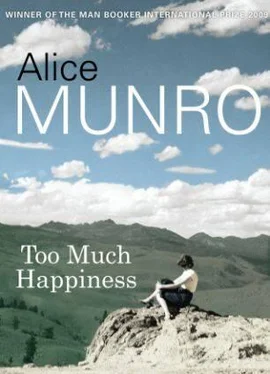I didn’t believe my mother really liked Verna either. But because of some hypocrisy in her nature, as I saw it, because of a decision she had made, as it seemed to spite me, she pretended to be sorry for her. She told me to be kind. At first, she said that Verna would not be staying long and at the end of the summer holidays would go back to wherever she had been before. Then, when it became clear that there was nowhere for Verna to go back to, the placating message was that we ourselves would be moving soon. I had only to be kind for a little while longer. (As a matter of fact it was a whole year before we moved.) Finally, out of patience, she said that I was a disappointment to her and that she would never have thought I had so mean a nature.
“How can you blame a person for the way she was born? How is it her fault?”
That made no sense to me. If I had been more skilled at arguing I might have said that I didn’t blame Verna, I just did not want her to come near me. But I certainly did blame her. I did not question that it was somehow her fault. And in this, whatever my mother might say, I was in tune to some degree with an unspoken verdict of the time and place I lived in. Even grown-ups smiled in a certain way, there was some irrepressible gratification and taken-for-granted superiority that I could see in the way they mentioned people who were simple or a few bricks short of a load . And I believed my mother must be really like this, underneath.
I started to school. Verna started to school. She was put into a special class in a special building in a corner of the school grounds. This was actually the original school building in the town, but nobody had any time for local history then, and a few years later it was pulled down. There was a fenced-off corner in which pupils housed in that building spent recess. They went to school a half hour later than we did in the morning and got out a half hour earlier in the afternoon. Nobody was supposed to harass them at recess but since they usually hung on the fence watching whatever went on in the regular school grounds there would be occasions when there was a rush, a whooping and brandishing of sticks, to scare them. I never went near that corner, hardly ever saw Verna. It was at home I still had to deal with her.
First she would stand at the corner of the yellow house, watching me, and I would pretend that I didn’t know she was there. Then she would wander into the front yard, taking up a position on the front steps of the part of the house that was mine. If I wanted to go inside to the bathroom or because I was cold, I would have to go so close as to touch her and to risk her touching me.
She could stay in one place longer than anybody I ever knew, staring at just one thing. Usually me.
I had a swing hung from a maple tree, so that I either faced the house or the street. That is, I either had to face her or to know that she was staring at my back, and might come up to give me a push. After a while she would decide to do that. She always pushed me crooked, but that was not the worst thing. The worst was that her fingers had pressed my back. Through my coat, through my other clothing, her fingers like so many cold snouts. Another activity of mine was to build a leaf house. I raked up and carried armloads of leaves fallen from the maple tree that held the swing, and I dumped and arranged these leaves into a house plan. Here was the living room, here was the kitchen, here was a big soft pile for the bed in the bedroom, and so on. I had not invented this occupation-leaf houses of a more expansive sort were laid out in, and even in a way furnished, every recess in the girls’ playground at school, until the janitor finally raked up all the leaves and burned them.
At first Verna just watched what I was doing, with her squinty-eyed expression of what seemed to me superior (how could she think herself superior?) puzzlement. Then the time came when she moved closer, lifted an armful of leaves which dripped all over because of her uncertainty or clumsiness. And these came not from the pile of spare leaves but from the very wall of my house. She picked them up and carried them a short distance and let them fall-dumped them-in the middle of one of my tidy rooms.
I yelled at her to stop, but she bent to pick up her scattered load again, and was unable to hang on to them, so she just flung them about and when they were all on the ground began to kick them foolishly here and there. I was still yelling at her to stop, but this had no effect, or else she took it for encouragement. So I lowered my head and ran at her and butted her in the stomach. I was not wearing a cap, so the hairs of my head came in contact with the woolly coat or jacket she had on, and it seemed to me that I had actually touched bristling hairs on the skin of a gross hard belly. I ran hollering with complaint up the steps of the house and when my mother heard the story she further maddened me by saying, “She only wants to play. She doesn’t know how to play.”
By the next fall we were in a new bungalow and I never had to go past the yellow house which reminded me so much of Verna, as if it had positively taken on her narrow slyness, her threatening squint. The yellow paint seemed to be the very color of insult, and the front door, being off center, added a touch of deformity.
The bungalow was only three blocks away from that house, close to the school. But my idea of the town’s size and complexity was still such that it seemed I was escaping Verna altogether. I realized that this was not true, not altogether true, when a schoolmate and I came face-to-face with her one day on the main street. We must have been sent on some errand by one of our mothers. I did not look up but I believed I heard a chuckle of greeting or recognition as we passed.
The other girl said a horrifying thing to me.
She said, “I used to think that was your sister.”
“What?”
“Well, I knew you lived in the same house so I thought you must be related. Like cousins, anyway. Aren’t you? Cousins?”
“No.”
The old building where the Special Classes had been held was condemned, and its pupils were transferred to the Bible Chapel, now rented on weekdays by the town. The Bible Chapel happened to be across the street and around a corner from the bungalow where my mother and father and I now lived. There were a couple of ways that Verna could have walked to school, but the way she chose was past our house. And our house was only a few feet from the sidewalk, so this meant that her shadow could practically fall across our steps. If she wished she could kick pebbles onto our grass, and unless we kept the blinds down she could peer into our hall and front room.
The hours of the Special Classes had been changed to coincide with ordinary school hours, at least in the morning-the Specials still went home earlier in the afternoon. Once they were in the Bible Chapel it must have been felt that there was no need to keep them free of the rest of us on the way to school. This meant, now, that I had a chance of running into Verna on the sidewalk. I would always look in the direction from which she might be coming, and if I saw her I would duck back into the house with the excuse that I had forgotten something, or that one of my shoes was rubbing my heel and needed a plaster, or a ribbon was coming loose in my hair. I would never have been so foolish now as to mention Verna, and hear my mother say, “What’s the problem, what are you afraid of, do you think she’s going to eat you?”
What was the problem? Contamination, infection? Verna was decently clean and healthy. And it was hardly likely that she was going to attack and pummel me or pull out my hair. But only adults would be so stupid as to believe she had no power. A power, moreover, that was specifically directed at me. I was the one she had her eye on. Or so I believed. As if we had an understanding between us that could not be described and was not to be disposed of. Something that clings, in the way of love, though on my side it felt absolutely like hate.
Читать дальше












